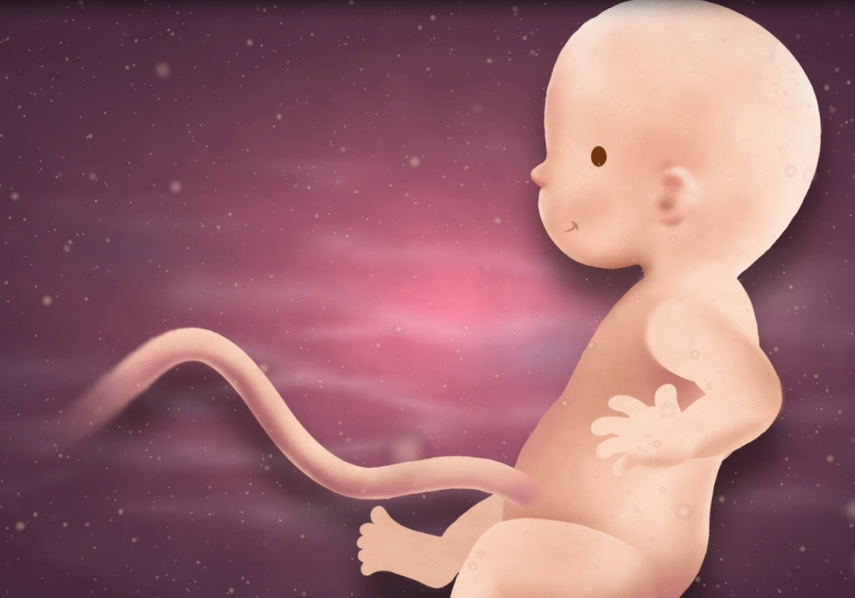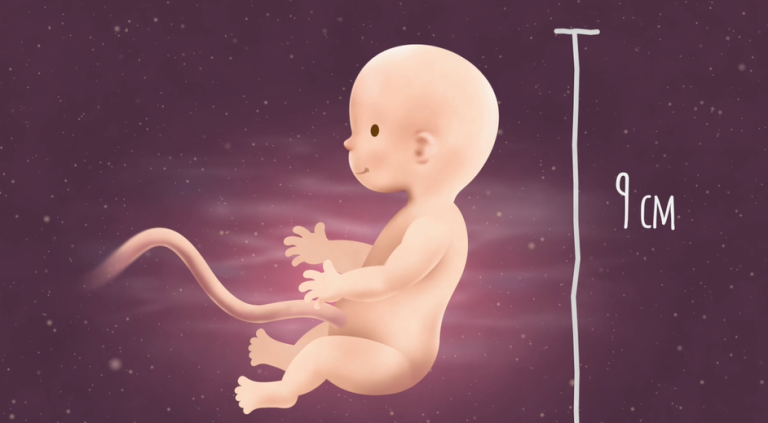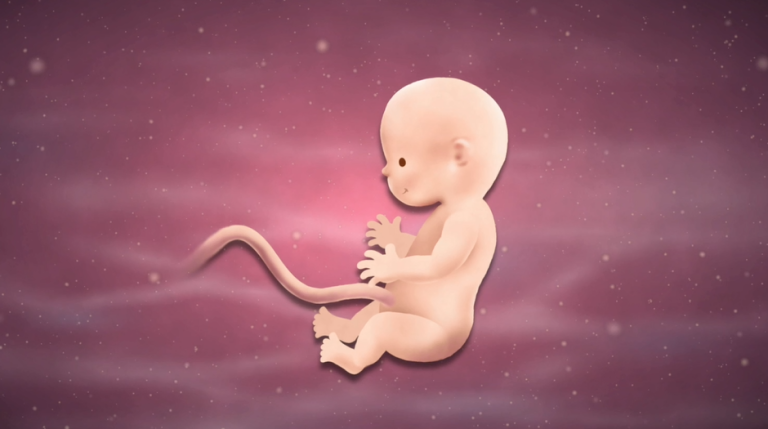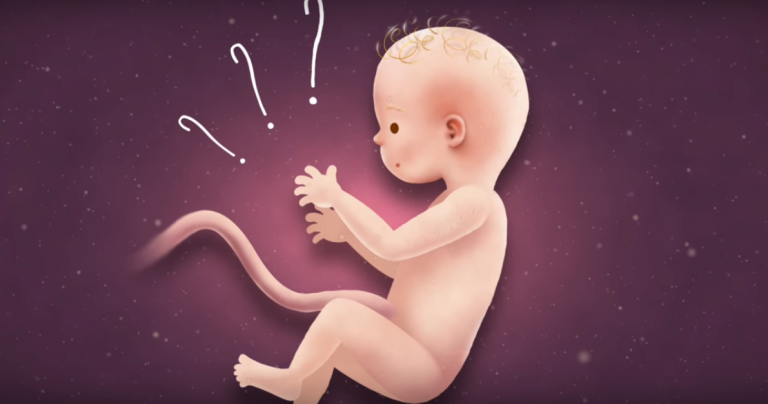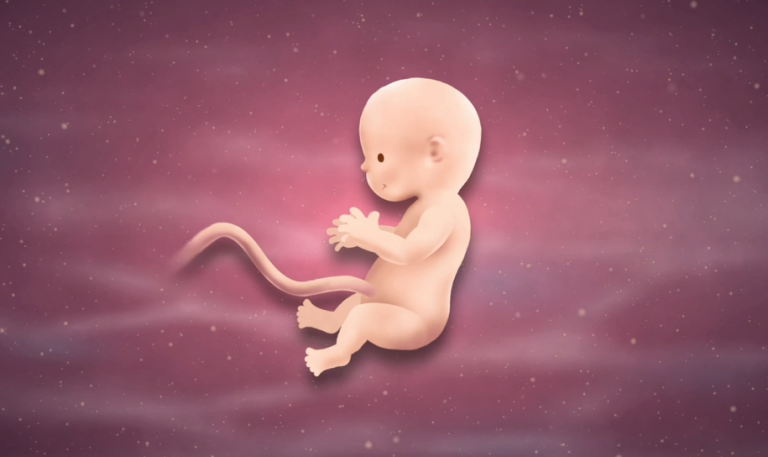As time slips through your fingers, you and your baby already go a long way. You have reached the thirteenth week of pregnancy. Pregnancy consists of three trimesters, each consisting of three months, and this is the last week of the first trimester. The first and last trimesters are the most difficult, and you have almost passed the first stage successfully. From now on, the changes will also become more apparent to the outside world. We have collected all the information you need about the changes awaiting you and your baby in the thirteenth week of pregnancy.
Your Baby at Thirteen Weeks
Every day is precious and brings novel changes during pregnancy. And with every change, further questions pop up in your mind. Many of these questions are, of course, about your baby. So, what do you need to know about your baby at thirteen weeks of pregnancy?
How Big is Your Baby at Thirteen Weeks?
One of the things you probably want to learn at every doctor’s check-up is how much your baby has grown. This growth is miraculous. Your baby started as a single cell thirteen weeks ago and will have fully developed in just another twenty-seven weeks.
You can find the average foetal length and weight in the table below. These values are averages and may vary from baby to baby due to differences in the moment of fertilisation, which cannot exactly be determined. If fertilisation occurred later than expected, your baby’s values might be lower. Only your doctor can tell you whether there is cause for concern or not.
| Gestational Age | Weight | Length |
| 13th week | 15-25 g | 6-8 cm |
Looking at these figures, you may notice that your baby has reached almost twice its size compared to the previous week. His growth rate is steadily increasing. Your thirteen-week-old baby now has approximately the size of a lemon.
Development of the Organ Systems and New Skills
Compared to the previous week, your baby now develops and grows faster. His organs are positioned where they should be, and some even start working. Let us look at the development of your baby’s organs and related systems at thirteen weeks of pregnancy.
- The Nervous System
The cerebellum started forming last week. The brain continues to develop, and in the thirteenth week of pregnancy, the nerve cells in the brain are surrounded by a layer of fat known as the myelin sheath. This insulating material increases the speed of the impulses in the nerve cells in the central and peripheral nervous systems. Also, the brain begins to give orders to certain glands to produce hormones.
- The Circulatory System
The yolk sac completely disappears in the thirteenth week. The placenta and umbilical cord completely take over the yolk sac’s functions. Thus, the circulation between mother and baby increases. Although your baby’s heart rate has slowed down compared to the previous weeks, it is still much faster than yours. You will be surprised about the speed when you hear your baby’s heartbeat during the ultrasound.
- The Digestive System
In the thirteenth week, your baby’s digestive system begins to work quite regularly. The amniotic liquid he swallows is filtered through the kidneys, absorbed through the intestines, and finally reaches the umbilical cord. The part that leaves the body through your baby’s urine again mixes with the amniotic fluid. The umbilical cord transfers waste via the placenta to the mother’s blood.
- The Respiratory System
The baby, who started to practice swallowing, also practises breathing in the thirteenth week. In the following weeks, your baby’s lungs and diaphragm will grow rapidly and begin to prepare for birth. Get ready for your baby’s first cries after birth as his vocal cords gradually complete.
- The Musculoskeletal System
A thirteen-week-old foetus can stretch his whole body and reflexively responds to stimuli. Your little one’s movements, which started in the previous weeks, become faster. You will be able to feel these movements when he reaches a sufficient size, and his bones and muscles become stronger. But he is still too small for that.
- The Urinary System
Your baby started to pee the previous week when his kidneys began to work. But you do not have to worry about this because any waste in the urine reaches your blood via the placenta.
- The Reproductive System
Many parents are very curious about the gender of their baby. The genitals complete their development in the thirteenth week of pregnancy. However, some babies do not want to show their gender during the ultrasound immediately, so you may have to wait a little longer to finally learn whether your baby is a boy or a girl.
- The Endocrine and Immune System
The amniotic fluid is important to protect your baby. In addition, your baby’s white blood cells started to form in the previous week, which continues this week.
Your Baby’s Movements at Thirteen Weeks
As we mentioned before, your baby’s movements are faster now. In addition to his body movements, his facial expressions will also become apparent. You might even see him smile on the ultrasound image if you are lucky. But it is still too early to feel your baby’s movements. In the coming months, you will feel his kicks and punches as his muscles and bones develop, but not now.
A Thirteen-Week-Old Foetus’s Sense Organs
As the brain’s nerve cells develop, so do your baby’s sense organs. So, your baby begins to sense many things. The formation of the myelin sheath in the brain accelerates this. Let’s find out at what stage of development your baby’s sense organs are at thirteen weeks.
- The Eyes and the Sense of Sight
Since your baby entered the foetal phase, his head has been larger than his body. At the same time, his face is smaller than his body. This may be a bit confusing, but it has to do with proportions. His facial features will become more pronounced and baby-like as his bones develop. His eyes continue to progress towards the middle of his face. But it is still too early for your baby to see.
- The Ears and the Sense of Hearing
The inner and outer ears are formed during the thirteenth week of pregnancy. As the ear grows, it gradually takes its final shape, and in a short while, your baby will be able to hear your voice.
- The Skin and the Sense of Touch
Touch is the first sense to develop. Your baby feels it when you touch your belly and will pull back. This week, also the soles of his feet will start feeling sensations. The lanugo hairs, the soft, downy hairs you see on a newborn, begin to appear. These will serve to keep him warm. These silky hairs are necessary because the baby does not have an insulating layer of fat to keep him warm.
- The Tongue and the Sense of Taste
The sense of taste further develops. A thirteen-week-old foetus can taste lactic acid, citric acid, urea, protein, and similar substances in the amniotic fluid. He also develops reflexes such as sucking and swallowing. You can even see your baby sucking his thumb on the ultrasound.
- The Nose and the Sense of Smell
Along with the sense of taste, the sense of smell also develops. Thus, while tasting the liquid he swallows, he also smells it.
How Many Months is Your baby at Thirteen Weeks?
Pregnancy is a period of nine months and ten days, corresponding to forty weeks. Although we are used to expressing this period in months, your doctor will talk about weeks. This may confuse you. So, how can you convert the number of weeks into months? Let us calculate this together:
1 week = 7 days, 1 month = 30 days
13 weeks = 13×7 = 91
91/30 = 3 months 1 day
Congratulations, now you can say that you are three months pregnant and have reached the end of the first trimester. You can look forward to the next, as many moms refer to the second trimester as the honeymoon of pregnancy. Many women choose to share the news of their pregnancy now, as the riskiest pregnancy period is over.
Your Body at Thirteen Weeks of Pregnancy
At the thirteenth week of pregnancy, you enter a new period in which your baby will grow even more rapidly. People around you will gradually notice that you are pregnant. Along with these physical changes, pregnant women also experience many psychological changes. Let’s look at the changes you can expect during the thirteenth week of pregnancy.
- Weight gain
You may feel your belly has to grow before the outside world understands you are pregnant. But there is no need to force this. Gaining extra weight will not make your baby healthier or grow faster. You need not eat for two at thirteen weeks, but you must eat a nutrient-rich, healthy, and well-balanced diet for yourself and your baby. In this way, you can also keep your weight gain under control.
- The expansion of your uterus and abdomen
As your uterus has grown and no longer fits its original position, it starts pushing your tummy out. It no longer presses on the bladder as much as before, so the problem of frequent urination decreases for a while.
- Stretch marks
As your abdomen expands, stretch marks may form. These may become deeper and wider if you gain weight fast. This is another reason to be careful about your diet.
- Breast tenderness and first milk formation
The sensitivity that started in the previous weeks continues. A fluid called “colostrum” begins to form in your breasts. This liquid full of nutrients is the first milk you will feed your baby.
- Vaginal discharge
It is normal to have discharge throughout pregnancy because of the increased oestrogen and blood circulation in the pelvic region. Of course, this has a purpose. Did you know that thanks to this discharge, the birth canal is protected from infections, and the number of healthy bacteria is balanced?
- Increased libido
One of the most surprising things about pregnancy is sexuality. Due to the increased blood circulation, it is normal for an expectant mother to experience increased libido. Experts believe that if you have a healthy pregnancy, you can safely have intercourse. You can talk to your doctor and ask about your particular situation.
- Spots on the skin
Your pregnancy skin problems may continue or worsen. You may also experience the so-called “pregnancy mask” (Chloasma), dark spots on your face or various parts of your body. This is temporary and generally disappears after delivery. If your skin problems are disturbing, you should talk to your doctor about treatment.
Suggestions to Minimise Troublesome Pregnancy Symptoms
Many women say that the best times of pregnancy begin in the thirteenth week. Your belly grows, and you are noticeably pregnant, but morning sickness reduces. However, the physical and hormonal changes during pregnancy can still cause troublesome pregnancy symptoms. We have compiled some easy-to-follow tips for you to minimise them.
- You may still experience bleeding gums. Brushing frequently with a soft brush will help. It is recommended for your health to use organic, fluoride-free toothpaste.
- Continue to drink plenty of water. This will help your digestive system function regularly and prevent oedema.
- Continue to consume enough iron via an iron supplement prescribed by your doctor and by consuming iron-rich foods to improve your blood circulation.
- Ensure you eat a healthy and balanced diet to support you and your baby. Remember to eat enough protein, calcium-rich foods, and foods rich in magnesium to decrease muscle cramps.
- Continue to eat fibre-rich foods. For example, it is better to consume a whole orange and benefit from the fibres than to drink orange juice without the fibres.
- As of this week, your baby will grow faster. Therefore, you should pay attention to your weight gain. Do not listen to the common saying: “During pregnancy, you have to eat for two.” Quick weight gain will not benefit your baby’s health. More importantly, you need to consume a nutrient-rich and well-balanced diet in adequate amounts.
- Weight gain is the main cause of the formation of stretch marks. So, you need to avoid sudden weight gain. Besides this, the following may help:
- Consume plenty of water and fluids to prevent oedema and eat foods high in antioxidants.
- Add adequate amounts of low-fat protein foods to your diet.
- The sun may worsen stretch marks, so try to stay out of the sun during the day in summer and avoid tanning your belly.
- Stabilising your weight by doing regular exercises will help prevent the formation of stretch marks.
How Much Weight Should You Gain?
Your baby has entered a rapid growth phase, so you will start gaining weight more quickly. Therefore, avoiding gaining too much weight during the first three months will increase your comfort level in the following months. Doctors advise women to gain about eleven to twelve kilos during pregnancy. Excess weight gain will not make your baby healthier. Most importantly, you need to eat a healthy, adequate, and balanced diet instead of eating for two. By the end of thirteen weeks of pregnancy, it is appropriate to have gained 2.5−3 kilos.
Nutritional Recommendations at Thirteen Weeks of Pregnancy
Your baby has entered a phase of rapid development. While he has grown and developed a lot in three months, he will grow even faster in the next period. As your baby receives all his nutrition through you, via the umbilical cord, and benefits of your nutrient stores and food consumption, you need to be even more careful about your diet. We have collected some dietary suggestions for you:
- Add protein-rich foods to your daily diet. You have surely taken care of this in the last three months, but you must be even more meticulous now. Ask your doctor’s advice. Foods such as lean meat, eggs, dairy products, nuts, and kidney beans are rich in proteins. Try eating fish at least once a week, as it is rich in protein and omega 3, but avoid fish high in heavy metals.
- Iron is particularly important during pregnancy. If you are iron deficient, your doctor will recommend an iron supplement. Iron is crucial because of the increased blood needed for growing this new creature in your body. Lean red meat is rich in iron. Besides that, you can also consume legumes and leafy greens like spinach, especially if you are a vegetarian.
- Getting enough calcium for your baby’s bone and teeth formation is extremely important. If you do not get enough calcium, your baby will use your body’s calcium stores, which may harm your health. You can get the necessary calcium by consuming four servings of dairy products daily.
- Stay away from caffeine. According to experts, caffeine passes directly to the baby through the placenta and causes low birth weight. Do not exceed one cup of coffee daily, or avoid coffee and caffeinated drinks altogether.
Exercise Recommendations at Thirteen Weeks of Pregnancy
Pregnancy should not get in the way of exercising or being active. Try being active whenever you can. Your baby bump has only started to grow, so it does not hinder you yet. Exercise is especially useful for weight control and strengthening your muscles at thirteen weeks s. Ideal activities are brisk walking, pregnancy yoga or Pilates.
Thirteen-Weeks-Pregnancy Checklist
- If you have not done this yet, it is a suitable time to have the nuchal translucency test, which checks for certain common foetal abnormalities, consisting of an ultrasound and blood analysis.
- You can start preparing for birth and the postpartum period. If you feel anxious or unsure, you can attend courses about birth, breastfeeding, baby care, etc. Besides correctly informing you, you will see many other pregnant women going through the same. You will feel less lonely during your pregnancy, which will help you relax.
- Your baby bump has finally started to show in the thirteenth week of pregnancy. This is the perfect time to shop for maternity clothes and start wearing comfortable clothes that do not put pressure on your belly.


